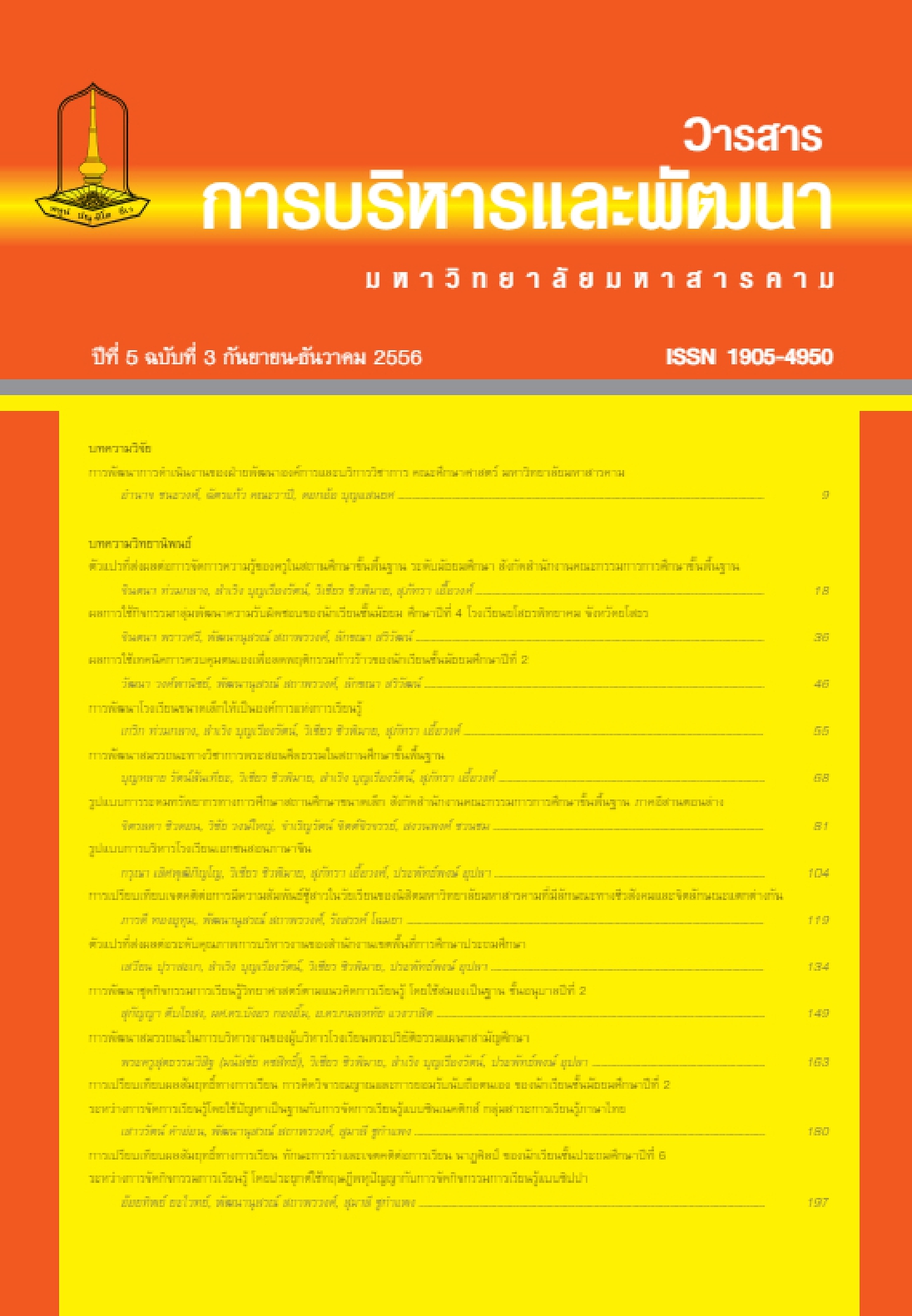DEVELOPING IN LEARNING ORGANIZATION OF SMALL SCHOOLS.
Main Article Content
Abstract
The purpose of this study was to develop small schools to be learning organization. The research methodology was as follows. The population was the small schools that had maximum of 120 students under the Office of the Basic Education Commission in the academic year 2011. The sample group comprised of fourteen small schools under the Office of the Basic Education Commission. These schools had fourteen directors and 61 teachers with the total of 75 staff who were purposively selected in this study from the small schools at Kham Sakaesaeng District under Nakhon Ratchasima Primary Education Service Area 5. The development procedures emphasized on improving directors’ academic leadership, teachers’ motivations and positive attitudes towards the schools’ learning organization which considered as the independent variables affecting the learning organization. The procedures consisted of arranging the workshop for directors and teachers, and acknowledging the participants on the topics of the learning organization, knowledge management, academic leadership of the school director, academic article writing, classroom action research and exchanging the knowledge from different academicians. Additionally, the results of the classroom action researches and the academic articles were presented; and brainstorming on the development procedures for the schools to be the learning organization was arranged. The pre- and post-development procedures were as follows. (1) Measure the levels of the learning organization of the schools, (2) Measure the levels of the academic leadership of the school directors, (3) Investigate the levels of the motivation of both the directors and the teachers, (4) Examine the levels of the attitudes of the directors and teachers towards the learning organization, and (5) At the post-development procedures, investigate the satisfactions of the school directors and teachers on the workshop. Sign Test was employed to investigate the differences of the pre- and post-development scores.
The findings revealed that The model of the learning organization development was derived from the directors’ academic leadership, teachers’ motivations and positive attitudes towards the schools’ learning organization. Therefore, these three variables must be developed by arranging the workshop for directors and teachers to understand the concepts of the learning organization, knowledge management, academic leadership, academic article writing and classroom action research. The results of the developments were as follows.
1. After the development of the learning organization, the small schools were increased higher levels of the learning organization with the statistical significant at α =.01 level.
2. After the development of the directors’ academic leadership, the levels of the academic leadership of small schools directors were increased at the statistical significant at α =.01 level.
3. After the development of the directors and teachers on the learning organization, knowledge management, classroom action research and academic article writing, the levels of the motivation of the small schools directors and teachers were increased at the statistical significant at α =.01 level.
4. After the development of the school directors and teachers on the learning organization and knowledge management, the levels of their attitudes towards the learning organization were increased at the statistical significant at α =.01 level.
Downloads
Article Details
References
Marquardt, Micheal J . (2002). Building The Learning Organization:Mastering the 5 Elements for Corporate Learning. California: Davies Black.
National Economic and Social Development Bureau. (2002). The ninth National Economic and Social Development Plan (2002 – 2006). Bangkok: Office of the National Economic and Social Development Board.
Office of the Basic Education Commission. (2006). Assessment Report on Small-sized School Quality Upgrading Project. Bangkok: The Agricultural Co-operative Federation of Thailand Printing.
Pote Sapianchai. (2003). Educational Institution Administrators and Researches to Create Learning Organization. 2nd Edition. Bangkok: Prikwan Graphic.
Samrerng Boonruangrutana, Pakorn Prajanban and Somsak Chansungnoen. (2010). “The Motivation of Teachers’ Inquisitive Mind as well as their Attitudes towards a School’s being a Learning Organization which affect the Academic Leadership of a School Administrator.” Vongchavalitkul University Academic Journal. (1):1-9.
Senge, Peter M. (2000). The Fifth Discipline: The Art And Practice Of The Learning Organization. London: Century.
Somkid Sroinam. (2004). The Development of the Learning Organization Model in the Secondary Schools. Thesis, Doctor of Philosophy in Education. Khon Kaen: Graduate School, Khon Kaen University.
Somsak Chansungnoen. (2009). Variables Affecting Levels of Learning Organization in Schools. Thesis, Doctor of Philosophy in Education. Nakhon Ratchasima: Faculty of Education, Vongchavalitkul University.
Sujit Hemwal. (2008). Influences of a Learning Organization on Educational Results of Basic Education Schools. Thesis, Doctor of Philosophy in Education. Nakhon Ratchasima: Faculty of Education, Vongchavalitkul University.
Suthiwan Pirasaksopon. (2002). Nonparametric Statistics. 3rd Edition. Mahasarakham: Apichart Printing.
Thongchai Somboon. (2006). Human Resource Development in an Organization. Bangkok: Pratsiam.
Vicharn Panich. (2004). Schools with Quality and Creativity. Bangkok: Pimdee.
Wirot Sanrattana. (2002). Schools: Learning Organization. 4th Edition. Bangkok: Aksarapipat.


